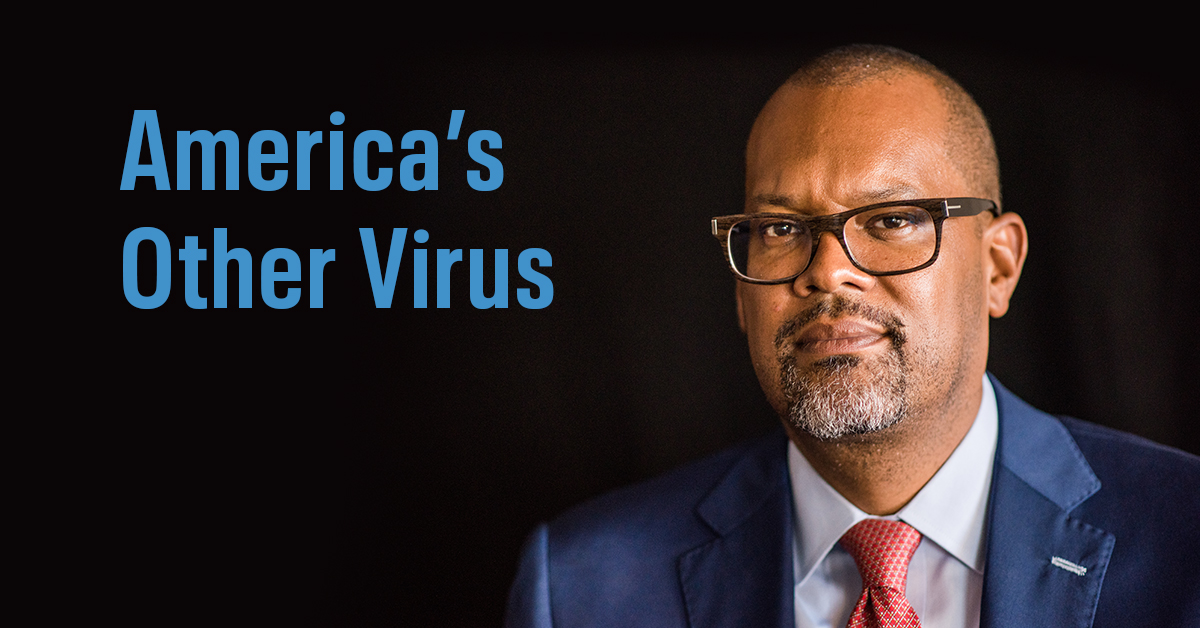The public murder of George Floyd and the days of unrest that have followed have opened up old wounds, and honestly, I have a hard time talking about it.
Once again, we have been reminded that we have a race problem. But for those of us who have been on the receiving end of oppression and injustice, we have been reminded of more. As a Black man, I am reminded that I am not safe, no matter my economic status or standing in the community. I am reminded that my son and daughter need instructions when they leave home that their white counterparts do not require. I am reminded that we have been here before—the marches, the kneeling, the protests, the speeches.
We have armed ourselves with data disaggregated by race, we have shared stories, and we have fine-tuned policies and practices to be responsive to injustice—and yet our race problem persists. Not only does it persist, it thrives even during a pandemic that is already disproportionately impacting people of color. I’ve said it through my previous blog posts, and I say it again today as I witness people across this nation raise their voices in protest: We have a race problem.
Yet I have been heartened by the numerous statements of outrage and support from all corners of the community and all sectors of society. I’ve received inspiration from young people voicing their truth and dissatisfaction with the status quo. Most importantly, I have found hope from people taking to the streets all over the country to say that it ends now. We stand in complete support of the organizing, activism, and protests that have been taking place to demand a new reality. I hope that it leads to transformative change.
We need change that is transformative, because work in the margins will not produce the change we seek. The kind of system that allows a police officer to commit murder in public with his hands in his pockets and a smug look on his face is the kind of system that requires dismantling and reconstruction, not reform in the margins. And our justice system is not the only one that must be transformed. COVID-19 has laid bare the vast structural inequalities in too many of our systems; a return to normal should not be on the menu.
I call on our donors and on all of philanthropy to meet this moment of need, crisis, and transformation. We must use our dollars and our voices to create a Bay Area and a nation where everyone thrives, no matter the color of their skin. Philanthropists must become advocates and use our privilege, power, and connections to enact fair policies that advance needed structural changes and dismantle generations of discrimination and racism. We cannot let only those with nothing to lose raise their voices; we must speak with them to demand change.
To our donors:
- Give now to nonprofits and groups you support.
- Give to COVID relief efforts especially those focused on the most vulnerable.
- Give to organizations advancing racial equity.
- Give to police reform.
- Give. We can help: see our giving recommendations.
To my colleagues in philanthropy:
- Look for partners, particularly those who are strategically and authentically advancing racial equity. Don’t make them look for you.
- Listen to and follow the wisdom of community.
- Support and listen to Black people in your organization. We are not ok, and we know a little something about what is going on.
- See young people and support their mobilization.
- Ask more questions, but more importantly take more action.
Four years ago, when the foundation made racial equity and economic inclusion our North Star, we knew that evidence-based programs and policies would only be effective if coupled with building power among those who are most impacted. The last few days of protest have called attention to these issues in ways that meetings, programs, and savvy advocacy for policy and systems change did not. They have proven that a strong civic voice for change matters; that organizing matters; and that the voice, wisdom, and outrage of community matters.
Our focus on racial equity and economic inclusion matters more than ever. Our practice of investing in people, place, and power is built for this moment. The San Francisco Foundation looks forward to working in solidarity with community to help us collectively live up to our great potential and to achieve a just and inclusive society where everyone can participate, prosper, and thrive.
I close with a statement from my friend and mentor Arnold Perkins:
“We are currently dealing with two viruses in this country, COVID-19 and RACISM-20. One kills the body, and the other kills the spirit. We must not let either win.”


